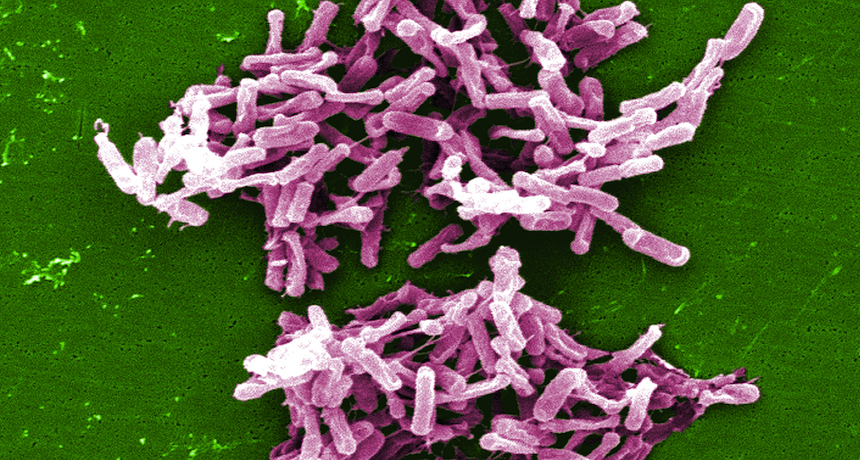Mining medicine from poop
The good germs in feces can be packaged into a pill that fights a killer infection

Infection by these bacteria, called C. difficile, can be deadly. Scientists have developed a new and effective treatment that uses beneficial bacteria found in the feces of healthy people.
CDC/Janice Carr
Infections caused by the bacterium Clostridium difficile pose big problems. The C. diff germs can trigger extreme gut discomfort and diarrhea. More troubling: In the United States alone, these germs kill some 14,000 people each year. Scientists have now found a new treatment that avoids the yuck factor associated with the old treatment, a fecal transplant.
Scientists didn’t really want to use feces; they only wanted the bacteria found in healthy people’s poop. If implanted in someone sickened by C. diff, those poop-derived bacteria could help restore a healthy balance of microbes in the intestines. And in a new study, researchers report they were able to get those healthy germs into patients without resorting to a poop swap.
The scientists filtered the good germs from feces and then sealed them in an easy-to-swallow capsule. This treatment cured the C. diff infections in 32 people. Thomas Louie presented his team’s findings at an October meeting of experts in infectious diseases. Louie is a doctor who studies infectious disease at the University of Calgary in Alberta, Canada.
In many cases, the capsule’s contents came from someone related to the infected patient. The process of filtering and wrapping the good bacteria takes a lot of effort, Tomas Moore told Science News. Moore, a doctor at the University of Kansas School of Medicine at Wichita, was not involved in the new work. Though the method may be difficult, he said it is worth pursuing.
The old method — the poop swap — worked too, but disgusted many patients. If packaging the fecal germs “is what it takes to overcome resistance … then by all means we should do it,” Moore concludes.
Patients may pick up a C. difficile infection after they’ve taken antibiotics for an especially long time. Antibiotics kill germs, but they can’t tell good from bad. So they may end up killing beneficial bacteria as well as harmful ones. And the gut is full of beneficial bacteria. Some fight disease. Some help us digest food. Others produce food that nourishes other good germs.
When the normal mix of bacteria in the gut gets out of balance, the body becomes a welcoming home for disease-causing germs. Transplanting feces can help by reseeding the gut with those helpful bacteria. Louie told Science News he first created the capsule alternative for a patient who could not withstand the transplant. So he isolated the good bacteria, “getting rid of everything else.”
The treatment requires taking more than two dozen capsules filled with the beneficial bacteria. Patients must down them all in a single day and on an empty stomach.
POWER WORDS
antibiotic A germ-killing substance prescribed as a medicine (or sometimes as a feed additive to promote the growth of livestock).
bacterium (plural bacteria)A single-celled organism forming one of the three domains of life. These dwell nearly everywhere on Earth, from the bottom of the sea to inside animals.
germ Any one-celled microorganism, such as a bacterium, fungal species or virus particle. Some cause disease. Others can promote the health of higher-order organisms, including birds and mammals. The health effects of most, however, remain unknown.
infection A disease caused by a germ that can be transmitted to people, animals or other living things.







